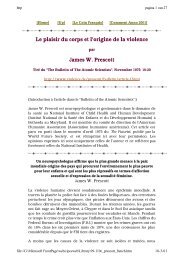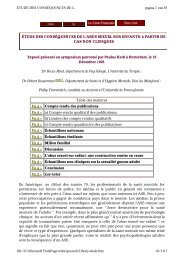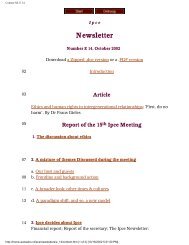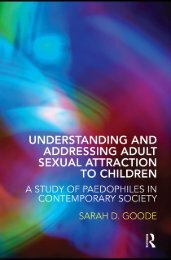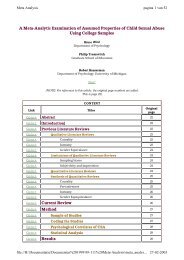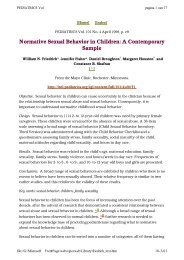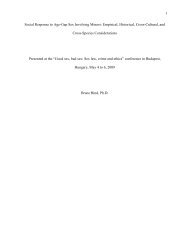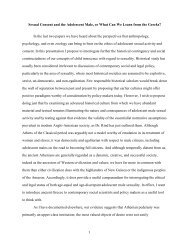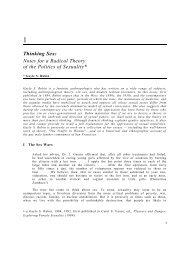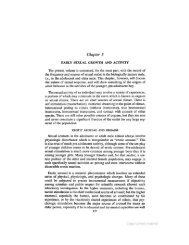Infant and Child Sexuality: A Sociological Perspective - Ipce
Infant and Child Sexuality: A Sociological Perspective - Ipce
Infant and Child Sexuality: A Sociological Perspective - Ipce
Create successful ePaper yourself
Turn your PDF publications into a flip-book with our unique Google optimized e-Paper software.
all children who are told to get “right to<br />
sleep” do. We began playing “doctor.” While<br />
playing, we both began toying with each other’s<br />
genitals. I did not receive much stimulation <strong>and</strong><br />
was primarily interested in touching <strong>and</strong> examining<br />
her. I knew nothing about sex at the time<br />
although I was aware that girls were different.<br />
While we were playing, my mother entered the<br />
bedroom <strong>and</strong> ordered us to get out of bed “that<br />
instant,” at the same time turning on the<br />
lights. I was able to recover my pants but Jane<br />
lost hers in the blankets. When she refused to<br />
get out my mother forced her to. Mother made us<br />
go out into the living room <strong>and</strong> st<strong>and</strong> in front<br />
of the adults, not allowing Jane to get dressed.<br />
While I cannot remember the adults’ exact words,<br />
they were shocked <strong>and</strong> angry. I felt extremely<br />
guilty.<br />
Lest the reader get the impression that only parents in Western societies<br />
with their Victorian morality repress sexual activity of children,<br />
we point out that punishment also characterizes the reactions of<br />
parents to children’s sexual encounters in some so-called nonliterate<br />
societies. Susii parents, for instance, do not tolerate sex play of<br />
their children. They beat both boys <strong>and</strong> girls for indulging in it. Nevertheless,<br />
children find opportunities to escape parental supervision<br />
<strong>and</strong> engage in heterosexuality. Adults are aware that children “in general”<br />
do such things, but they become upset on learning that a child of<br />
their own has done so.<br />
In sexual situations involving child <strong>and</strong> parent in the United<br />
States, the parental responses are commonly unambiguous if the parental<br />
response is a negative one. If the parent seems undecided as to<br />
what his own response should be, his response is commonly ambiguous or<br />
he postpones any response to some not clearly defined later time. The<br />
responses are labeled in parentheses in the cases that follow. An ambiguous<br />
parental response, coupled with apparent affect, is accompanied<br />
by a negative injunction in the following case.<br />
My mother found out what was going on (homosexual<br />
activity involving ego--seven years old--<strong>and</strong><br />
a twelve year old boy) since I had confided my<br />
experiences to my younger brother. She was angry<br />
(negative affect), but also a bit confused it<br />
seemed (ambiguous response). She looked at me as<br />
if I were a creature from the outer galaxies.<br />
Then she told me how wrong it was to be doing<br />
things like that (negative evaluation). How I<br />
could have used a good lecture on sex at that<br />
moment! Although dad never said anything about<br />
the incident, he <strong>and</strong> mom would come into my room<br />
at night <strong>and</strong> would ask me questions. At one time<br />
I overheard dad talking, telling mom that I<br />
should be taken to a doctor (ambiguous response).<br />
Of course this scared me. His parents were also<br />
informed, <strong>and</strong> we were forbidden to see or talk to<br />
one another (unambiguous negative response).<br />
58



